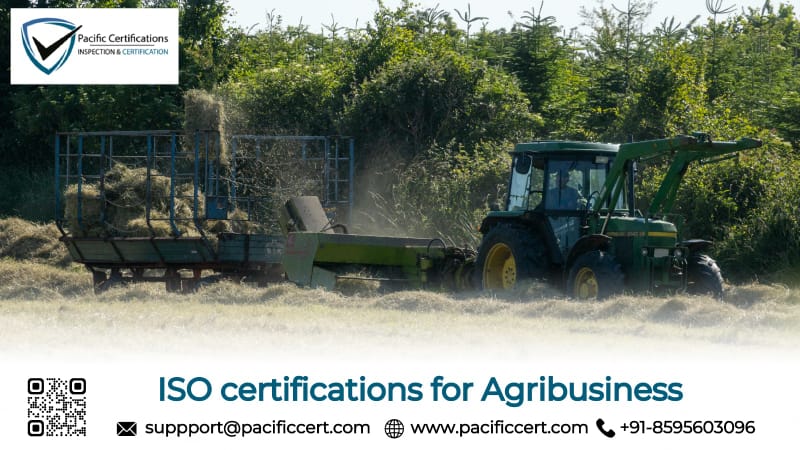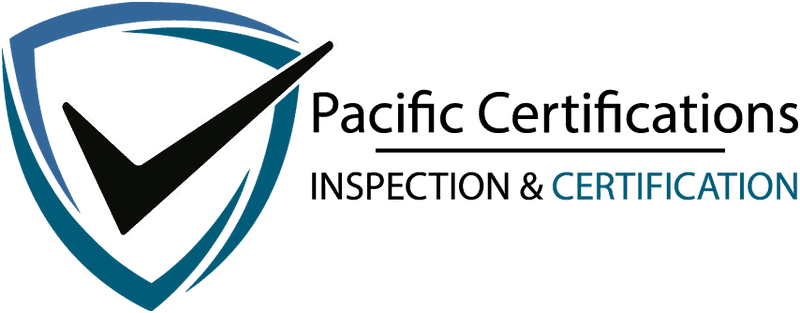ISO Certifications for Agribusiness, Popular Standards, Requirements and Benefits

In the dynamic and ever-evolving agribusiness sector, achieving and maintaining high standards of quality, safety, and sustainability is crucial. ISO certifications provide a robust framework for agribusiness industry to enhance their operations, comply with regulations, and meet customer expectations.
Below are the key ISO standards applicable to agribusinesses:
Key ISO Standards for Agribusiness
ISO 9001:2015 - Quality Management Systems: ISO 9001:2015 sets out the criteria for a quality management system. It is based on several quality management principles including a strong customer focus.
ISO 14001:2015 - Environmental Management Systems: ISO 14001:2015 provides a framework for environmental management best practices, helping organizations minimize their environmental footprint.
ISO 22000:2018 - Food Safety Management Systems: ISO 22000:2018 outlines the requirements for a food safety management system and is applicable to all organizations in the food chain, including agribusiness companies.
ISO 45001:2018 - Occupational Health and Safety Management Systems: ISO 45001:2018 is designed to improve employee safety, reduce workplace risks, and create better, safer working conditions.
ISO 26000:2010 - Social Responsibility: ISO 26000:2010 provides guidance on how businesses and organizations can operate in a socially responsible way.
ISO 50001:2018 - Energy Management Systems: ISO 50001:2018 supports organizations in all sectors to use energy more efficiently through the development of an energy management system.
Click here to find out more applicable standards to your industry
How Pacific Certifications can help
At Pacific Certifications, we specialize in auditing and certifying businesses to ensure compliance with ISO standards. Here’s how we can assist:
- Audit Services: Our team of experienced auditors conducts thorough audits to assess your company's compliance with the relevant ISO standards. We evaluate your processes, documentation, and practices to ensure they meet the stringent requirements of the standards.
- Certification: Upon successful completion of the audit, we issue the ISO certification, which serves as a testament to your company's commitment to quality, safety, and sustainability.
- Surveillance and Re-certification: Audits To maintain your ISO certification, regular surveillance audits are necessary. We provide ongoing support through periodic audits to ensure continued compliance. Additionally, we conduct re-certification audits at the end of the certification cycle to renew your certification.
The agribusiness sector continues to evolve with advancements in technology, sustainable practices, and regulatory changes. In 2024, there is a significant emphasis on sustainability and climate-resilient farming practices.
Moreover, the integration of digital technologies in farming operations is transforming how companies manage quality and environmental impacts, making ISO 9001 and ISO 50001 more relevant than ever.
For more information on how we can assist your agribusiness company with ISO certification, please contact us at [email protected]!
Requirements of ISO Certifications for Agribusiness
ISO certifications establish a systematic framework for organizations to enhance their processes, ensure quality, manage risks, and promote sustainability. Here are the key requirements:
ISO 9001:2015 - Quality Management Systems
- Establish and communicate a quality policy and objectives aligned with the company's strategic direction.
- Identify and manage interrelated processes to improve overall performance.
- Identify potential risks and opportunities and take appropriate actions to mitigate or leverage them.
- Maintain documentation to support the quality management system (QMS) and provide evidence of its effective implementation.
- Ensure customer requirements are met and enhance customer satisfaction through effective communication and feedback mechanisms.
ISO 14001:2015 - Environmental Management Systems
- Develop an environmental policy reflecting the company's commitment to environmental protection.
- Identify and comply with applicable legal and other environmental requirements.
- Determine the environmental aspects and impacts of the company’s activities, products, and services.
- Set environmental objectives and targets, and establish programs to achieve them.
- Implement procedures to control operations that can have significant environmental impacts.
ISO 22000:2018 - Food Safety Management Systems
- Develop and communicate a food safety policy.
- Conduct a hazard analysis to identify potential food safety hazards and establish control measures.
- Implement PRPs to maintain a hygienic environment and ensure safe food production.
- Establish a system to trace the history, application, and location of food products.
- Develop plans to address potential food safety emergencies.
ISO 45001:2018 - Occupational Health and Safety Management Systems
- Create a policy outlining the company's commitment to providing a safe and healthy workplace.
- Identify workplace hazards and assess risks to determine appropriate control measures.
- Ensure compliance with relevant health and safety legislation.
- Provide necessary training to employees to ensure they are competent to perform their duties safely.
- Establish procedures for investigating and responding to workplace incidents.
ISO 26000:2010 - Social Responsibility
- Implement transparent and accountable governance structures.
- Respect and promote human rights within the organization and its supply chain.
- Ensure fair labor practices, including fair wages, working hours, and safe working conditions.
- Engage with the local community and contribute to its development.
Benefits of ISO Certifications for Agribusiness
Achieving ISO certification offers numerous advantages to agribusiness, enhancing their operational efficiency, marketability, and sustainability. Here are the key benefits:
- Implementing ISO standards helps standardize processes, leading to more efficient operations and reduced variability.
- ISO 9001 certification ensures that products and services meet consistent quality standards, boosting customer satisfaction.
- ISO 14001 certification helps companies minimize their environmental footprint through efficient resource use and waste reduction.
- ISO 26000 certification showcases the company’s commitment to social responsibility, improving its reputation and stakeholder relationships.
- Certifications can open doors to new markets, especially in regions where ISO compliance is a prerequisite for business.
- ISO certifications ensure that the company complies with relevant legal and regulatory requirements, reducing the risk of fines and legal issues.
- Implementing ISO 45001 enhances workplace safety, leading to higher employee morale and productivity.
ISO certifications are essential for agribusinesses striving to improve their operations, enhance quality and safety, and demonstrate their commitment to sustainability.
Pacific Certifications is accredited by ABIS, in case you need support with ISO certification for your Agribusiness, please contact us at [email protected] or +91-8595603096.
FAQs - ISO Certifications for Agribusiness
Q1: What is ISO 9001:2015 and how does it benefit agribusiness?
ISO 9001:2015 is a standard for Quality Management Systems (QMS). It helps agribusiness companies improve product quality, enhance customer satisfaction, and streamline processes by establishing a framework for consistent quality management practices.
Q2: Why is ISO 14001:2015 important for agribusinesses?
ISO 14001:2015 focuses on Environmental Management Systems (EMS). It aids agribusinesses in reducing their environmental impact, improving resource efficiency, and ensuring compliance with environmental regulations, which is crucial for sustainability.
Q3: What does ISO 22000:2018 cover and why should agribusiness implement it?
ISO 22000:2018 sets the requirements for Food Safety Management Systems (FSMS). Agribusiness companies should implement it to ensure food safety throughout the supply chain, manage food safety hazards effectively, and enhance consumer confidence.
Q4: How can ISO 45001:2018 benefit the workforce in agribusiness?
ISO 45001:2018 provides guidelines for Occupational Health and Safety Management Systems (OHSMS). It helps agribusinesses create a safer work environment, reduce workplace risks, and improve employee well-being and productivity.
Q5: What is the purpose of ISO 26000:2010 for agribusiness?
ISO 26000:2010 offers guidance on Social Responsibility. It assists agribusiness companies in operating in a socially responsible manner, addressing ethical concerns, human rights, and community involvement, thereby enhancing their reputation.
Q6: How does ISO 50001:2018 support energy management in agribusiness?
ISO 50001:2018 focuses on Energy Management Systems (EnMS). It helps agribusiness companies improve energy efficiency, reduce energy costs, and minimize greenhouse gas emissions, contributing to environmental sustainability.
Q7: What role does Pacific Certifications play in ISO certification for agribusiness?
We conduct audits and issue ISO certifications. We assess agribusiness’s compliance with ISO standards, ensuring they meet the necessary requirements and helping them achieve and maintain certification.
Q8: Why is ISO certification important for market competitiveness in agribusiness?
ISO certification enhances an agribusiness company's credibility, improves product and service quality, ensures regulatory compliance, and opens access to new markets. This competitive edge can lead to increased customer trust and business growth.
Q9: What trends are influencing the need for ISO certifications in agribusiness?
In 2024, there is a growing emphasis on sustainability and climate-resilient farming practices. Consumers are demanding greater transparency and accountability, driving agribusinesses to adopt standards like ISO 22000 and ISO 14001 to meet these expectations.
Q10: How can an agribusiness company start the process of ISO certification?
We provide detailed guidance, conduct audits, and help ensure the company meets all the necessary ISO requirements for certification.
Read More at: Blogs by Pacific Certifications

